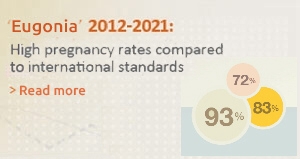During ICSI, a very small percentage of oocytes may be damaged despite all the precautions. However, the oocytes that have endured the process of injection and have regained their initial shape usually develop normally. Those that do not are isolated and are not transferred.
Recent epidemiological studies in a large number of patients showed that the percentage of congenital abnormalities in neonates conceived by ICSI is not different and reaches about 2.7%. This percentage was found to be similar to children from IVF or even natural conception.
Since male infertility may have a genetic basis, there is a possibility of transmission of infertility to the male offspring. This means that these children may need ICSI themselves when they decide to have children. This case concerns a rare form of azoospermia that is caused by microdeletions on the Y chromosome. For this reason, it is recommended to seek genetic consultation for men with severe OAT or azoospermia (obstructive azoospermia due to congenital absence of the vas deferens and possible relation with a mutation in the gene of cystic fibrosis). At a european and international level the research on the safety of ICSI is ongoing.






























